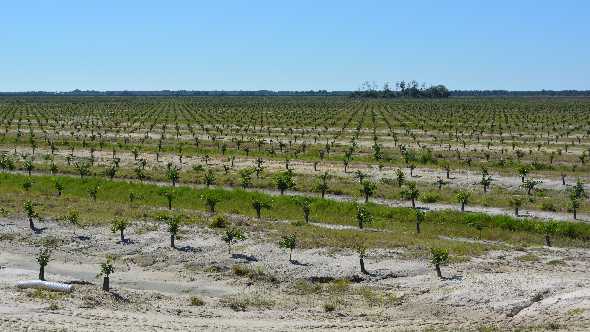Citrus Scientists Look to Solve Irrigation Equation

New studies might turn the tables on established citrus irrigation standards in the presence of greening. Photo by Frank Giles
Through much hard work and experimentation over multiple years, citrus researchers have found mature trees affected by citrus greening need about 25% less irrigation than their healthy counterparts. But, what about young trees? A team of UF/IFAS scientists is on the case.
Via a preliminary greenhouse-based study funded by the UF/IFAS Citrus Research Initiative, experiments on 1-year-old orange trees (Hamlin sweet orange on Swingle citrumelo rootstock) showed similar responses to irrigation in healthy trees and those affected greening. Diseased or not, the trees grew faster when they received daily irrigation that kept pace with losses from evapotranspiration.
According to Davie Kadyampakeni, an Assistant Professor based at UF/IFAS’ Citrus Research and Education Center (CREC) in Lake Alfred, this result suggests that young, greening-affected trees benefit most from a full ration of water, a finding that was somewhat surprising based off past research.
“Over the past few years, there has been interest in the possibility that mature trees with HLB might benefit from temporary irrigation deficits, because when we impose those conditions it can force a tree to improve its water-use efficiency,” Kadyampakeni stated in a UF/IFAS news release. “But, our findings indicate that young trees with HLB (greening) grew faster when they received what growers would consider a full ration of water.”
Though Kadyampakeni recognizes the early results regarding are promising, he and his team are not ready to issue any official citrus irrigation recommendations, especially given the fact the study was conducted in a greenhouse setting. “We need to follow up with field trials, probably over a period of time close to three years, to assess the irrigation needs of young trees under typical industry conditions.”
Detailed findings from the study is slated for publication in the near future.









